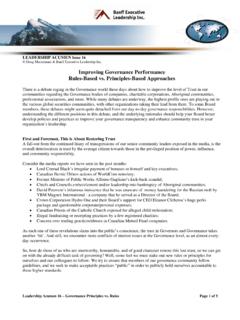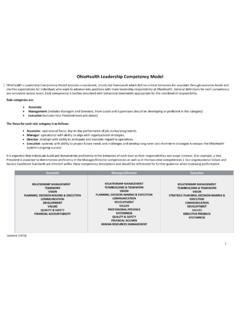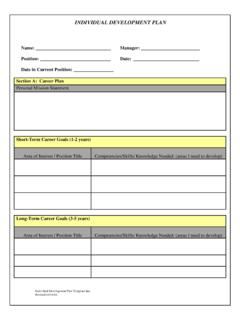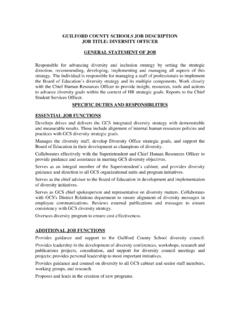Transcription of What’s in a Job Title? - Banff Executive Leadership Inc.
1 Leadership acumen 27 what s in a Job title ? Page 1 of 10 Leadership acumen Issue 27 November 2006 Doug Macnamara & Banff Executive Leadership Inc. what s in a Job title ? As you and your partner walk into the weekend social gathering you realize you will have to introduce yourself to others. Your mind races what should I say? Hello, I am Doug, father of Robert and Leah for some that might be the best intro. Hello I am Doug, 1st husband of Liane for others that would definitely be most valuable! Hello, I am Doug, outdoor enthusiast, explorer of culture and arts, international man of mystery. Likely closest to the truth, but will they care? No. what most people want to know indeed they will politely press you again and again to find out is what you do for a living.
2 what is your job title ? In today s society, we have become significantly defined by our job titles. And, we often define ourselves by our titles. Not that I think this is healthy, however this has become particularly clear in the work we do with executives in transition or when recruiting new employees. And so, at a time when so many people put so much weight on titles, I am interested to note that we have become terribly sloppy with the use of job terminology. Both job incumbents and the executives hiring employees seem to have forgotten what various titles connote. Of course, we are also getting very creative in establishing new titles many which challenge our sensibilities. Thus I thought it might be valuable for readers to have a little primer on creating/using job titles.
3 You may not need it today but chances are this will be a good reference for you in the next few months! Here s what is covered: Fundamentals of Management levels and titles C-Suite titles becoming standard around the world Learning from a Grand Experiment that failed Concepts from Requisite Organization and Elliott Jacques Application to Realities of today Fundamentals of Management Titles In the first organization in which I became a Vice-President, I was invited into a meeting with the VP Compensation & Benefits. As I entered his office and shook hands, he closed the door and congratulated me. what followed was a formal session outlining the organization s expectations of me. Performance and Results of course, but also community service, role model & ethical practices, privileges, and so on.
4 The brief also included information on how the Executive committee worked and how I was expected to know about the whole organization not just my Division. It was at this point that I truly appreciated the difference between watching VP s in action (from lower in the organization), and now understanding the ramifications of the unseen responsibilities and accountabilities of being an Executive . In the second organization which I served as a VP, it seemed the big distinction was in what kind of company car I was allowed to have. Other than that, there was a general vacuum of concrete and specific expectations although we did engage in strategic meetings and behave as a bit of a select club looking out for the whole organization.
5 Leadership acumen 27 what s in a Job title ? Page 2 of 10 In the third organization in which I served as VP, I think it was generally expected that because of my experience, I would know what was meant by being part of the Executive team. Over the first 6 months of watching and listening to others, and feeling the effects of different personal contributions around the exec table, the specific expectations of this organization became clear. However, there was one formal conversation I had with the President and CEO that I will never forget. As a vice-president, you are acting on my behalf, said the CEO. You are not representing your Division to me, rather I expect you to lead and manage the Division on my behalf.
6 This was a blinding flash of the obvious yet I immediately understood that in so many organizations today this simple concept is not appreciated or understood either by the VP s themselves or the people lower in the organization. In fact, in many organizations, and for countless members of the management cadre, the specific expectations, accountabilities and chain-of-command are poorly communicated. Here then, are the core elements of distinction within the levels of the management cadre. Supervisor This is the first level in most management structures and lifts one up out of the professional role or front-line provider role individual contributor to a responsibility bigger than your self. Performance - Your performance is measured by your ability to get others to meet performance expectations, to grow and develop.
7 Accountability - Generally to a manager, to ensure all your people achieve their tasks on-time, on-budget, with appropriate quality. Responsibility - Usually the supervisor has limited budget or other resource flexibility, or decision-making leeway. Their main responsibility is to delegate tasks, coach, support and motivate those you supervise to achieve expectations for those tasks. Of course, these are important expectations and responsibilities. You must learn to adapt your style and support coaching to the unique needs of each employee. In many settings, you are also a team leader responsible for getting people to work effectively together. Manager At this level, most organizations expect you to manage resources , or manage clients/ accounts or manage projects.
8 This could include managing staff, but not always; sometimes you are expected to work by influence rather than formal authority. The distinction over a Supervisor position is that a Manager is expected to exert judgment about prioritization, juggling of different deliverables with available resources, and allocating those resources in order to achieve results. Performance - Ability to meet or exceed longer-term objectives perhaps project-based or quarterly/ annual targets. - Ability to motivate and empower staff, supervisors, external suppliers to achieve excellence as well as performance targets. This includes training, career support, recruitment and performance management. Accountability - Achievement of annual/quarterly results, within a given but somewhat flexible Budget.
9 Results tend to include financial, service, quality, efficiency, professional standards and other measures. - Often the Manager is asked to draft his/her annual budget and performance measures in-line with higher level organizational goals. Responsibility - To understand how your area fits into the bigger picture interdependencies and communicate this with those you manage. - To exert good judgement in your use of, prioritization and allocation of organizational resources. - To take initiative to advance the organization through your own or your team s innovations. Leadership acumen 27 what s in a Job title ? Page 3 of 10 - To cross-boundaries within and external to your organization to enhance your effectiveness and advance the organization.
10 - A level of self-direction and self-motivation in aligning personal and team actions with the goals of the organization. In a manager-level position, you are expected to summon-up your own energy to take some risk, take initiative and contribute beyond the words of a job description. Waiting to be told what to do, then doing it is not in the zone of being a manager. You are expected to figure out what needs to be done and make it so. In exerting judgement you will occasionally make mistakes. Managers take personal responsibility for mistakes, missed performance expectations and work to fix the problem, then get things back on track ASAP. Managers focus first and foremost on delivering results, and orchestrating others clients, staff, volunteers, suppliers, etc.







